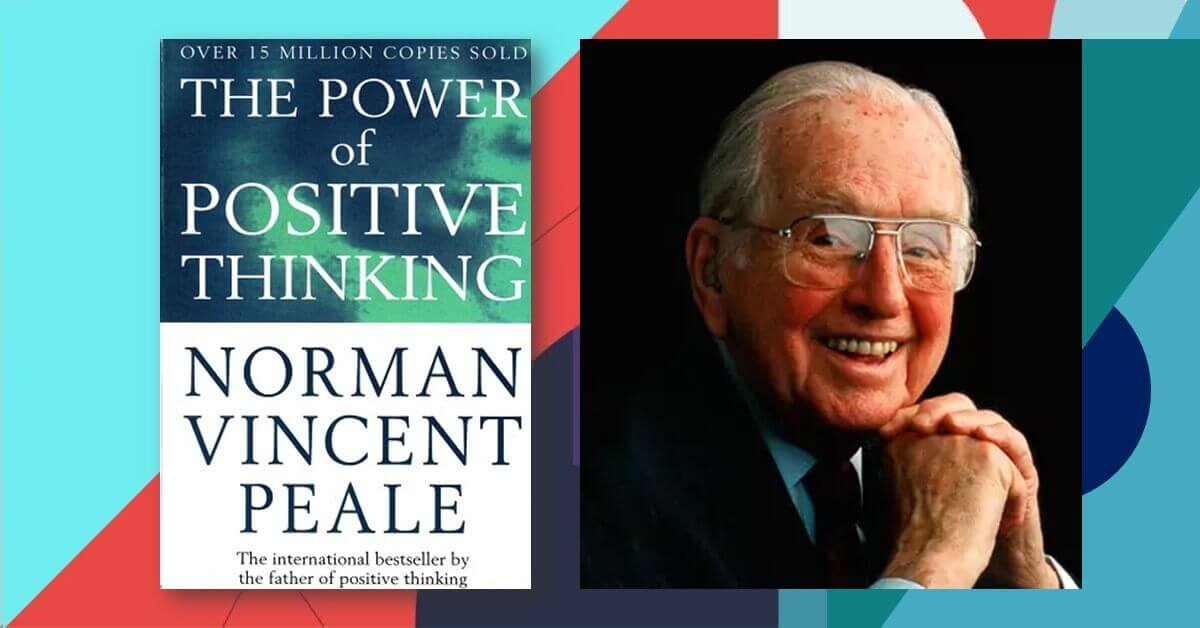Last updated on December 11th, 2024 at 12:17 pm
It is a book review of The Power of Positive Thinking. It is one of the best-selling books across the globe which I have had the privilege of reading after nearly seventy years of its publication. As a Bangladeshi, the best-selling books do sometimes end up in the retail book-stores in Bangladesh. Or have to buy from Amazon which is not certainly an easy feat.
It is one of the best-selling books across the globe which I have had the privilege of reading after nearly seventy years of its publication. As a Bangladeshi, the best-selling books do sometimes end up in the retail book-stores in Bangladesh.
Or have to buy from Amazon which is not certainly an easy feat.
Background
I ordered The Power of Positive Thinking, out of curiosity, through a Facebook page of a local book-store located more than 250 kilometres away.
It turned out to be an amazing reading with numerous account from the people who had been having a tough time in maintaining positive perceptions about circumstances, fate people and themselves. With many practical suggestions of self-improvement, The Power of Positive Thinking can be one of the life-changing books that you might have been expecting. It has left a profound impression on me, made me pause and re-think, revise and reconsider a lot of affairs in my life.
Written by an evangelical pastor, Norman Vincent Peale, in 1953, the author certainly tried The Power of Positive Thinking to be curative reading for hopeless, goalless, depressed, despondent and broke-hearted people.
As the profession of author suggests, he tried to bring psychological healing power to the readers on the basis of faith in God, God of any faith.
Basing the Bible a treasure-trove of palliative of mind The Power of Positive Thinking bears more or less 80 quotations all over the book, mostly from Psalms, Isiah and the New Testament. The frequent quotation from the Bible might be a let-down for readers of different faiths and atheists.
Nevertheless, regardless of the fact of its repeated mentions of God, the Bible and religion the book can be an outstanding read which is focused on ‘Positivism’.
However, if you think you are struggling with destructive form negativity, hopelessness, consistent failure, losing influence, lack of mental vitality and spiritual degradation The Power of Positive Thinking can be a true friend in that regard.
The Power of Positive Thinking contains 17 beautiful chapters, such as Believe In Yourself, A Peaceful Mind Generates Power, How to Have Constant Energy, Try Prayer Power, How to Create Your Own Happiness, Stop Fuming and Fretting, Expect the Best and Get it, I Don’t Believe In Defeat, How To Break The Worry Habit, Power to Solve Personal Problems, How to Use Faith In Healing, When Vitality Sags, Try This Formula, Inflow of New Thoughts Can Remake You, Relax for Easy Power, How to Get People Like You, Prescription for Heartache and How to Draw Upon That High Power.
If you have not had the chance to read the book the following suggestion and a few excerpts from a few chapters that I like most can help you in changing your negativity to positivity.
How To Believe In Yourself

It is a very suggestive chapter for the people who dare not having belief in themselves.
Many of us are filled with a sense of inferiority, powerlessness, inadequacy and lack of self-confidence which lead to constant failure. It is not undoubtedly true that many of us lack confidence, inwardly afraid, suffer from a deep sense of inadequacy and feel powerless.
Our inadequacy, powerlessness, and inferiority originates in not knowing our own capabilities. We cannot realise what we are capable of until we stand up and inquire about the things we already have in our disposal. The author suggests us to realise our assets and our attitude towards them decide the results.
“How you think about a fact may defeat you before you ever do anything about it”, says the author, “you may permit a fact to overwhelm you mentally before you start to deal with it actually.
On the other hand, a confident and optimistic thought pattern can modify or overcome the fact all together’.
In order to overcome the feeling of powerlessness, inadequacy and inferiority complex the author suggests the followings:
- Formulate and stamp indelibly on your mind a mental picture of yourself as succeeding. Hold the picture tenaciously, and never permit to fade it. Never think of yourself as failing; never doubt the reality of the mental image. That is the most dangerous because the mind always tries to complete what it pictures. So, always picture `success’ no matter how badly things seem to be at the moment.
- Whenever a negative thought comes to your mind concerning your personal power, deliberately voice a positive thought to cancel it.
- Do not build up obstacles in your imagination. Depreciate every so-called obstacle. Minimise them. Difficulties must be studied and dealt with to be eliminated, but they must be seen for only what they are. They must not be inflated by fear thoughts.
- Do not be awe-struck by other people and try to copy them. Nobody can be as efficient as YOU can.
- Ten times a day repeat these dynamic words: ‘If God is for us who can be against us?’
- Learn to origin your inferiority and self-doubt feelings which often begins in childhood.
- Make a true estimate of your ability, then raise it 10 per cent. Do not become egotistical, but develop a wholesome self-respect. Believe in your own God-released power.
- Remind yourself that God is with you and nothing can defeat you. Believe that you now RECEIVE power from Him.
How to have a peaceful mind that generates power

This is another one of the fascinating chapters in The Power of Positive Thinking that I really like. The chapter deals with our daily mental catharsis that involves our sickly thought patterns. Mental restlessness resulted in many physical infirmities.
Exhaustion, tiredness dawn on us. A mind full of peace is the most necessary than a mind full of troubles to be productive. The essence of secrete of mind full of peace mostly depends on our mental attitude. Our mental attitude toward difficulties makes life straining. The life of inner peace, being harmonious and without stress is the easiest task of existence.
Here the author suggests that “to be happier and healthier we need to renew our mind that is a change in our thought pattern”.
Do not build up obstacles in your imagination. Depreciate every so-called obstacle. Minimise them. Difficulties must be studied and dealt with to be eliminated, but they must be seen for only what they are. They must not be inflated by fear thoughts.
To gain a mind full of peace one must practise emptying the mind from fear, hate, insecurities, regrets and guilt-feelings, and to put this burden on God, develop the psychology of casting them out our consciousness and forgetting what is behind.
“When the mind is emptied”, suggests the author, “Fill it with creative and healthy thoughts. Once the mind is filled with creative and healthy thoughts, the old fear hates, and worries that have haunted you for so long trying to get back in but they in effect find a sign on the door of your mind reading ‘Occupied’.
When restlessness and worry try to get on you, “think carefully a series of peaceful thoughts. Let the mental picture of the most peaceful scenes you have ever witness pass across your mind. Practise the technique of suggestive articulation, that is, repeat audibly some peaceful words, such as, ‘tranquillity’, ‘peace’, ‘serenity’. Let nothing disturb you. Let nothing frighten you. Everything passes away, except God”.
Moreover, attitudes are active and definite factors in creating satisfactory conditions. The words we speak have a direct and definite effect on our thoughts. Practise silence and fill your daily conversation with a positive, happy, optimistic and satisfying expression. These can certainly bring our mental peace in our mind.
How to have constant energy

How we think and feel has a definite effect on how we actually feel physically.
We are tired when our mind tells us so. The body mechanism, the nerve, and the muscle accept the fact that we are tired. In fact, this chapter of The Power of Positive Thinking how to gain unfailing energy in order to keep ourselves get going with our activities.
The author says, ‘it is not hard work that drains our energy, but emotional upheaval. Energy leakage is caused by our hereditary or self-imposed emotional reaction of debilitating nature’.
For a balanced emotional life, the conservation of mental energy is important and that conservation energy totally depends on us and our attitude.
“People are tired simply because they are not interested in anything. Nothing ever moves them deeply. To some people, it makes no difference what’s going on or how things go. Their personal concerns are superior even to all crises in human history. Nothing makes any real difference to them, except their own little worries, their desire and their hates”.
We lose our energy only when life becomes dull in mind, and if our mind is deeply interested we can keep on our activity indefinitely. “The more we lose ourselves into something bigger than ourselves the more energy we get”.
“Our energy depletion can only be restored with spiritual development. We gain our needed sufficient energy once our emotion is under spiritual control. The feeling of hatred blocks our energy, and people with a lack of energy are disorganised to one degree or another by their deep, fundamental, emotional psychological conflicts”.
Active outdoor living, reading scripture, relief of guilt, hate, being free from obsession and conflicting mental quirks, emotional maturity are suggestive for renewing mental energy. (The book provide a more detailed account in this regard).
How to create your own happiness

Who decides whether you shall be happy or unhappy?
You do. Just as Abraham Lincoln said, ‘people are just about as happy as they make up their mind to be’, we can be unhappy if we want to be, while it is the easiest to accomplish.
Even though not all unhappiness is self-induced, many of us manufacture our own unhappiness in our thoughts, attitude and imagination.
“Happiness is achievable and the process for attaining it is not complicated”, according to Norman Peale, the author. “To put an end to the unhappiness-producing and misery-producing process, we have to produce our own happiness. Our happiness or unhappiness depends to an important degree upon the habit of mind we cultivate. Therefore, in order to have happiness, cultivating positive and affirmative thoughts is very important.
Just choose unhappiness and go ahead telling yourself that nothing is going well, that nothing is satisfactory, and you can be quite sure of being unhappy. But say yourself, ‘things are going nicely, life is good, I choose happiness, and you will be quite certain of having your choice
– Norman Vincent Peale, The Power of Positive Thinking
“A Psalmist verse which you can repeat three times every day as you arise: ‘This is the day that Lord has made, we will rejoice and be glad in it’.
“While dressing or shaving or getting breakfast, say aloud a few such remakes as the followings: ‘I believe this is going to a wonderful day. I believe I can successfully handle all the problems that will arise today. I feel good physically, mentally, emotionally. It is wonderful to be alive. I am grateful for all that I have had, for all that I now have, and for all that I shall have. Things are not going to fall apart. I thank God for every good thing”.
Keeping heart from hate, mind form worry, practising love, living simply, expecting little, giving much, forgetting self and thinking of others can crate utmost happiness in our mind. Because happiness is determined by our thought, therefore, it is necessary to drive off the thoughts which are responsible for depression and disappointment.
How to stop fuming and fretting

Do you ever ‘fume’ and ‘fret’, the author asks.
Here is a picture of you if you do. The word ‘fume’ means to boil up, to blow up, and to emit vapour, to be agitated, to be distraught, and to seethe. The word ‘fret’ is equally descriptive. It is reminiscent of a sick child in the night, a petulant half-cry, half-whine, it ceases, only to begin again. It has an annoying, irritating, penetrating quality.
To fret is a childish term, but it describes the emotional reaction of many adults”.
Many people make life unnecessarily difficult for themselves by wasting power and energy through fuming and fretting. To gain power for effective life we must stop fuming and fretting. The first step to that is to reduce the pace. We hardly realise how accelerated the rate of our life has become or the speed at which we are driving ourselves. It is impossible to have the peace of soul if the pace of life is so feverishly accelerated which ultimately destroys us in body, mind and soul.
The pace of modern life must be reduced if we are not to suffer profoundly from its debilitating over-stimulation and super excitement. This over-stimulation caused by accelerated pace produces toxic poison in the body and causes various emotional illnesses.
It produces fatigue and a sense of frustration so that we fume and fret about everything from our personal troubles to the state of the national and the world.
The author has suggested six points to help reduce the tendency of fume and fret. Some are mentioned as followed:
- Sit relaxed in a chair. Completely yield yourself to the chair. Starting with your toes and proceeding to the top of your head, conceive of every portion of your body as relaxing. Affirm relaxation by saying: ‘My toes are relaxed, my fingers are relaxed— my facial muscle.
- Think of your mind as a surface of a lake in a storm, tossed by waves and in tumult. But now the waves subside and the surface of the lake is placid and unruffled.
How to expect the best and get it

Truly believing is the key to getting the best.
We will get the worst once we start believing in having the worst and get the best if we expect the best merely through faith. Faith is the most powerful law in the world, a law recognised in psychology and religion. In faith learn to expect, not to doubt. In so doing we bring things in the realm of possibility.
According to psychologist William James, “our belief at the beginning of a doubtful undertaking is the one thing that ensures the successful outcome of your venture”.
The author says that “when you expect the best you release a magnetic force in your mind which is the law of attraction tends to bring the best to you. But if you expect the worst, you release from your mind the power of expulsion which tends to force the best from you”.
Things become better when you expect the best instead of the worst, because the reason that being freed from self-doubt you can put your whole self into your endeavour, and nothing can stand in the way of the man who focuses his entire self on a problem”. When the entire concentration of all your forces—physical, emotional and spiritual—is brought to bear, the consolidation of these powers properly employed is quite irresistible. And “expecting the best means that you put your whole into what you want to accomplish, while people are defeated not because of lack of ability but because of lack of wholeheartedness.Throw the heart over the bar and your body will follow”. The heart is the symbol of creative activity. Fire the heart with where you want to go and what you want to be. Get it so deeply fixed in your unconscious that you will not take NO for an answer, then your entire personality will follow where your heart leads”.
So the formula is to know what you want, test it to see if it is a right thing, change yourself in such a manner that it will naturally come to you and always have faith. Your expectation must have a clearly defined objective. Lots of people do not go anywhere because they do not know where they want to go. They have no clear0cut, precisely defined purpose. You cannot expect the best if you think aimlessly.
A man who is self-reliant, positive, optimistic, and undertakes his works with an assurance of success magnetises his condition. He draws to himself the creative power of the universe. Unless you really want something to create an atmosphere of positive factors by your dynamic desire, it is likely to elude you.
If there is something you want, in the first place ask yourself: Should I want it? Test that question very honestly in your prayer to be sure you should want it. If you can answer that question affirmatively, then ask God for it, do not backward in asking Him.
How to break the worry habit

Who does not worry? What is worry?
It is simply an unhealthy and destructive mental habit. People are not born with worry habits. You acquire it. And because you can change any habit and any acquired attitude you can cast worry from your mind. Fear is the most disintegrating enemy of human personality, and worry is the most subtle and destructive of all human diseases.
An expert found that people who lived and contended life for the following reasons: 1) They kept busy, 2) they used moderation in everything, 3) they ate lightly and simply, 4) they got a great deal of fun out of life 5) they were early to bed and early up 6) they were free from worry and fear (especially the fear of death), 7) they had serene mind and faith in God.
To live a worry-free life and to break the worry habit the author suggested the following. Some are included:
- Say to yourself: ‘Worry is just a very bad mental habit. I can change any habit with God’s help.
- You can become a worrier by practising worry. You can become free of worry by practising the opposite and stronger habit of faith. With all the strength and perseverance you can command, start practising the faith.
- Practise saying something positive concerning everything about which you have been talking negatively. Talk positively.
- Never participate in the worrisome conversation. Shoot an injection of faith into all of your conversations. A group of people talking pessimistically can infect every person in the group with negativism. But talking the thing up rather than down, you can drive off that depressing atmosphere and make everyone feel hopeful and happy.
- Cultivate friendship with hopeful people. Surround yourself with friends who think positive, faith producing thoughts and who contribute to the creative atmosphere. 6. Every day of your life conceives of yourself as living partner and companionship with Christ Jesus.
- See how many people you can help to cure their own worry habit. In helping another to overcome worry you get grater power over it within yourself.
Power to solve personal problems

It is another great chapter I dearly like about The Power of Positive Thinking. We all have our own problems to deal with, but not all problems are dealt with easily. Relational problems, business problems, financial problems, spiritual problems and professional problems. But all problems have one criterion that is: it erodes our mental peace.
No matter what sort of problems we are embroiled with, a positive and prayerful attitude with divine guidance, and patience toward them bring satisfactory results in the end. According to the author, “in getting the correct solution to your problems, however, it is necessary to go a step further than believing this, for one must practise the idea of presence (presence of God). Practise believing that God is as real and actual as your wife, or your business partner or your close friend”.
Nevertheless, the author proposes ten simple problem-solving techniques in this chapter that are followed as:
- Believe that for every problem there is a solution.
- Keep calm. Tension blocks the flow of thought power. Your brain cannot operate efficiently under stress. Go ahead with your problems easy-like.
- Do not try to force an answer. Keep your mind relaxed so that the solution will open up and becomes clear.
- Assemble all the facts impartially, impersonally and judicially.
- List these facts on paper. This clarifies your thinking, bringing the various elements into an orderly system. You see as well as you think. The problems become subjective, not objective.
- Pray about your problems, affirming that God will flash illumination into your mind. 7. Believe in and seek God’s guidance on the promise of Psalm 73.
- Trust in the faculty of insight and intuition.
- Go to Church (if you are a Christian), and let your subconscious work on the problem as you attune to the mood of worship.
- If you follow these steps faithfully, then the answer develops in your mind, or comes to pass, is the right answer to your problems.
When vitality sags try this health formula
Many people are today ill because of the influence of improper mental states on their emotional and physical well-being when prayer, faith and dynamic spiritual thinking can of vital importance as medicine.
“It is not the question whether an illness is physical or emotional, but how much of each. Doctors are right when they tell us that resentment, hate, grudge, ill will, jealousy, vindictiveness are the attitude that produces ill-health. Have a fit of anger and experience for yourself that sinking feeling in the fit of your stomach. The chemical reaction in the body is set up by emotional outburst that results in feelings of ill health”.
Here on page 210, the author mentions the most distinguished Scottish scientist and surgeon, Dr Hunter who died of a heart attack caused by a fit of anger.
The author suggests some practical suggestions of antidote to irritation, anger, hate and resentment so that you can cultivate goodwill, forgiveness, faith, love and the spirit of imperturbability.
- Remember that anger is an emotion, and emotion is always warm, and even hot. Therefore to reduce an emotion, cool it. How do you cool it? When a person gets angry, the fists tend to clench, the voice rises in stridency, muscle tense, and the body becomes rigid. So deliberately oppose the heat of this emotion with coolness—
freeze it out. Deliberately, by an act of will keep your hand from clenching. Hold your fingers out straight. Deliberately, reduce your tone, bring down it to whisper. Remember that it is difficult to argue in a whisper. Slump in a chair or even lie down if possible. It is very difficult to get mad lying down.
- Anger is a great term expressing the accumulated vehemence of a multitude of minor irritation. These irritations, each rather small in itself, having gathered force by reason of the one being added to the other, finally blaze forth in a fury that often leaves us abashed at ourselves. Therefore, make a list of everything that irritates you.
- Make each separate irritation a special object of prayer. Get a victory over each, one at a time. Instead of attempting to destroy all your anger, snip away by prayer each annoyance that feeds your anger. You may read the book for the rest techniques.
The inflow of new thoughts can remake you

Great psychologist William James said, “human beings can alter their lives by altering their attitude of mind”.
Roman stoic philosopher and emperor Marcus Aurelius said, “A man’s life is what his thoughts make of it”. “We are shaped by our thoughts; we become what we think”, said Buddha. We become what we think, get how we think.
Therefore, let us flush out the old, tired and worn-out thoughts and fill our minds with renewed, creative thoughts of faith, optimism, positivism, love, goodness, and collective well-being. We can think of our way of failure and unhappiness, but we can also create our way to success. “The world in which you live is not primarily determined by outward conditions and circumstances, but by thoughts that habitually occupy our mind”. The American philosopher and poet Ralph Waldo Emerson said, “A man is what he thinks about all day long”.
The world in which you live is not primarily determined by outward conditions and circumstances, but by thoughts that habitually occupy our mind.
We can indeed make ourselves in or out of situations.
We are capable of making ourselves ill in your thoughts, and at the same time, we can make ourselves well by different, and healing thoughts. The author says, “Think one way and you attract the conditions which that type of thinking indicates. Think another way and you can create an entirely different set of conditions. Conditions are created by thought far more powerfully than thoughts create conditions”.
The Power of Positive Thinking contains seven for changing our mental attitude from negative to positive, for releasing creative new thoughts, and for shifting from error patter to truth patter:
- For the next 24 hours, deliberately speak hopefully about everything, about your job, about your health, about your future. Go out of your way to talk optimistically about everything. This will be difficult, for it is your habit to talk pessimistically. From this negative habit, you must restrain yourself even if it requires an act of will.
- After speaking hopefully for 24 hours, continue the practice for one week, when you can be permitted to be realistic for one day or two. You will discover that what you meant by ‘realistic’ a week ago actually pessimistic, but what you now mean by ‘realistic’ is something entirely different; it is the dawning of a positive outlook. When most people say they are being ‘realistic’ delude themselves: they are simply being negative.
- You must feed your mind even as you feed your body, and to make your mind healthy you must feed it nourishing and wholesome thoughts. Start to shift your mind from negative to positive thinking. Start at the beginning of the New Testament and underscore every sentence about faith.
- Make a list of your friends to determine who is the most positive thinker and them deliberately cultivate his society. Do not abandon your negative friends, but get closer to those with a positive point of view for a while, until you have absorbed their spirit, then you can go back among your negative friends and give them your newly acquire thoughts pattern without talking on their negativism.
- Avoid argument, but whenever a negative attitude is expressed, counter with a positive and optimistic opinion.
Conclusion
With these, I am going to end this writing by saying that The Power of Positive Thinking is an amazing book capable of changing ones’ habitual negative points of view regarding life, living, profession, relation, and even death. There are a couple of other great chapters that I haven’t had a touch on.
Having said that many people who have already read it have found the book to be a promotion of Christianity and Churches. In a sense, such opinions might sound right to many who are strongly undecided whether there is God or not, in such a position The Power of Positive Thinking may not be very much of help as it was written on the Biblical, especially the teaching of our Lord Jesus Christ.
Notwithstanding, The Power of Positive Thinking can be used as a great source of encouraging thoughts by the people who are restoring the business of broken hearts.

You may like the review on The Doctor and The Saint by Arundhati Roy
Arundhati Roy shows how radicalism and discrimination against the lower caste people in India are still pervasive, even though people regard Gandhi as a saint, Hinduism still controls everything. Continue reading.
About the Author
Norman Vincent Peale is one of the most widely read inspirational writers of all time. He was co-editor and co-publisher (with his wife of over sixty years, Ruth) of Guideposts magazine and senior minister of the Collegiate Reformed Protestant Dutch Church of the City of New York. He was the recipient of many awards throughout his long and illustrious career, including the Presidential Medal of Freedom.






